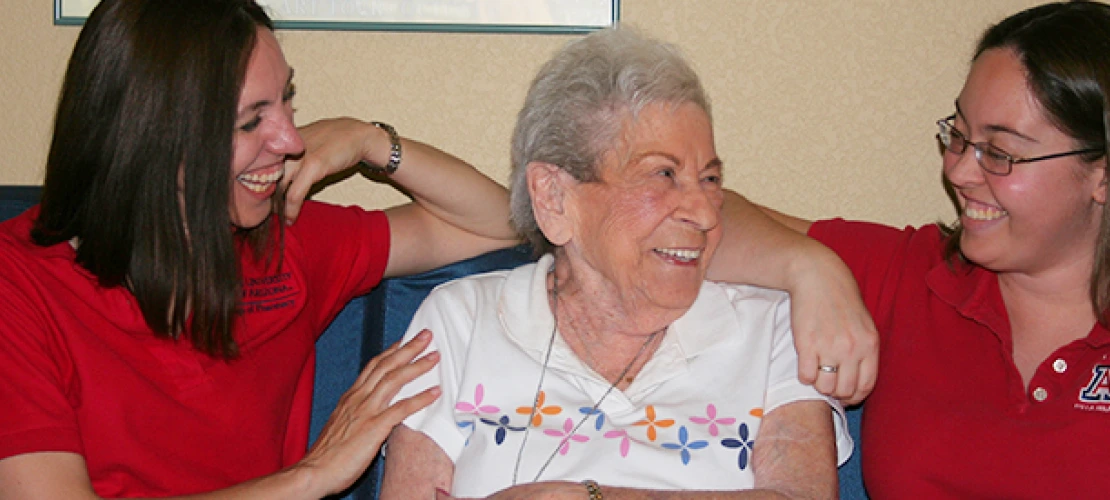PharmD students begin their Introductory Pharmacy Practice Experiences in the second semester of their first year of pharmacy school.
These experiences include:
-
Working with volunteer older adults
-
Shadowing fourth-year students on rotations
-
Completing community and institutional rotations
After their third year, students transition to the Advanced Pharmacy Practice Experience.
Four Experiences
First-year pharmacy students will spend time with older adults, practicing interviewing and counseling skills, administering assessments, and reviewing medication, health, and vaccine histories.
Objectives
- Through aging simulation exercises, gain an understanding/appreciation of what is like to be an older adult.
- Identify issues in communicating effectively with older adults and caregivers.
- Develop and practice cultural competence (an ability to understand, communicate with, and effectively interact with people across cultures) when interacting with older adults.
- Conduct and document a medication history and recognize and refer any pertinent older adult concerns to the appropriate health care provider.
- Create and/or update older adults’ medication lists.
- Demonstrate the use of common tools for the assessment of mental status, health literacy, nutrition, depression, sleep, fall risk etc.
-
Identify and discuss treatment priorities in older adults with complex medical histories.
Objectives
- Expose the student to role of a pharmacist in various pharmacy practice settings.
- Provide understanding of the types of pharmacy practices, workloads, and relationships with and attitudes of health care providers.
- Allow the student to observe and interact with the pharmacist and P4 student while in various pharmacy practice settings.
- Expose the student to aspects of patient care and disease state management in a pharmacy practice setting in order to complement the knowledge, skills and attitudes learned in the classroom.
- Develop communication and social interactive skills, critical problem-solving skills, and a sense of professionalism, responsibility, and accountability with regards to the practice of pharmacy.
- Introduce the student to the structure and content of advanced clinical rotations in preparation for their own advanced rotations.
- Share P4 shadow/site visit experiences with classmates.
Second-year and third-year IPPE students will be assigned to both community (IPPE-Community) and institutional (IPPE-Institutional) sites. Students will complete 120 hours of rotation at each site. In most cases, students will complete two rotations during their second year and one during their third year. There will be some exceptions to this depending on availability of sites.
Goals
- To allow the student the opportunity to observe health care professionals applying pharmacy knowledge in a community pharmacy setting.
- To allow the student to participate in the daily activities of a community pharmacy practice setting.
- To allow the students to apply basic knowledge to real-world settings under the guidance of a preceptor.
- To prepare the student for APPEs (Advanced Pharmacy Practice Experiences).
Objectives
Community Pharmacy Environment
- Act in a professional manner, demonstrating concern for patient welfare and right to patient privacy.
- Describe community pharmacy patient care settings.
- Observe the differences in health care provider roles in the community setting.
- Explain how pharmacists interact with other health care providers.
- Contribute to patient care in community pharmacy setting.
- Describe cultural, economic and social differences in relation to provision of care in a community pharmacy.
Medication Order Preparation and Counseling
- Obtain relevant information from patient, caregivers or patient records.
- Fill, label, and dispense medications accurately and efficiently.
- Establish and maintain pharmacy records by accurately documenting pertinent information.
- Review laws and policies for dispensing controlled substances.
- Review and explain patient education materials with patient.
Drug Information
- Utilize drug information retrieval skills in the community pharmacy setting.
- Summarize the community pharmacist’s responsibility in counseling patients in the community pharmacy.
Community Pharmacy Management
- List the responsibilities of the pharmacist in providing care to patients in the community setting.
- Describe procedures of inventory control.
- Participate and contribute to discussions with pharmacists and other health care providers.
Second-year and third-year IPPE students will be assigned to both community (IPPE-Community) and institutional (IPPE-Institutional) sites. Students will complete 120 hours of rotation at each site. In most cases, students will complete two rotations during their second year and one during their third year. There will be some exceptions to this depending on availability of sites.
Goals
- To allow the student the opportunity to observe health care professionals applying pharmacy knowledge in a pharmacy setting.
- To allow the student to participate in the daily activities of a hospital or institutional pharmacy practice setting.
- To allow the students to apply basic knowledge to real-world settings under the guidance of a preceptor.
- To prepare the student for APPE (Advanced Pharmacy Practice Experiences).
Objectives
Hospital Pharmacy Environment
- Act in a professional manner, demonstrating concern for patient welfare and right to patient privacy.
- Describe hospital pharmacy patient care settings.
- Observe the differences in health care provider roles in the hospital setting.
- Explain how pharmacists interact with other health care providers.
- Describe cultural, economic and social differences in relation to provision of care in a hospital pharmacy.
Medication Order Preparation
- Obtain relevant information from patient, caregivers or patient records.
- Fill, label, and dispense medications accurately and efficiently.
- Prepare simple IV solutions using proper technique, measuring and reconstitution of the drug product.
- Establish and maintain pharmacy records by accurately documenting pertinent information.
- Review laws and policies for dispensing controlled substances.
Drug Information
- Utilize drug information retrieval skills in the hospital setting.
- Summarize the pharmacy department’s responsibility in discharging patients from the institution.
Hospital Pharmacy Management
- List the responsibilities of the pharmacist in providing care to patients in the hospital setting.
- Describe procedures of inventory control.
- Participate and contribute to discussions with pharmacists and other health care providers.



